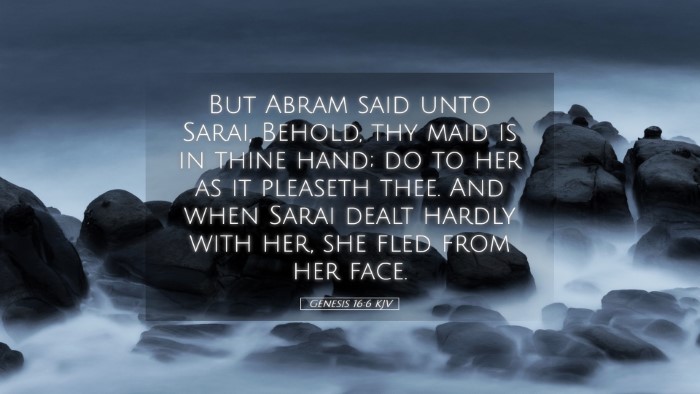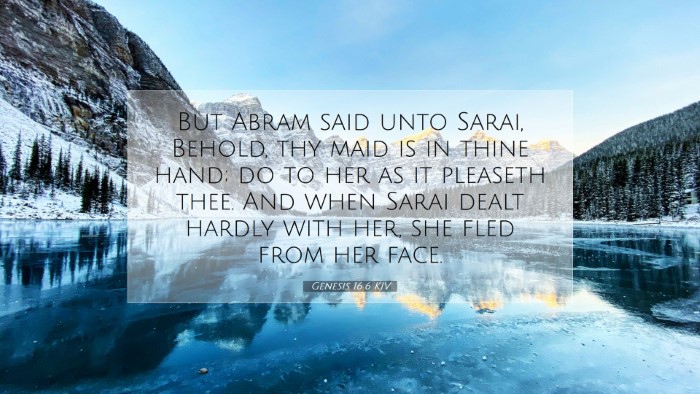Commentary on Genesis 16:6
Genesis 16:6 states:
“But Abram said to Sarai, 'Indeed your maid is in your hand; do to her as you please.' And when Sarai dealt harshly with her, she fled from her presence.”
Introduction
This verse captures a pivotal moment in the narrative of Abram and Sarai, where human impatience and the desire for self-fulfillment lead to conflict. This commentary synthesizes insights from several public domain sources, offering theological reflections and practical applications.
The Context of the Passage
Historical Setting: The events leading to Genesis 16:6 unfold against the backdrop of God's promise to Abram regarding his descendants. However, Sarai, being barren, resorts to a culturally accepted practice of having a child through her maid, Hagar.
Cultural Practices: In the Ancient Near East, it was common for a barren wife to provide her maid to her husband. This was a way to ensure lineage, yet it was fraught with potential complications, as evidenced in this story.
Analysis of Key Elements
-
Abram's Role:
Matthew Henry notes that Abram's compliance with Sarai’s suggestion reflects a passive disposition towards God's promises. His failure to confront Sarai’s impatience reveals a significant moral and spiritual weakness.
-
Sarai's Actions:
Albert Barnes emphasizes Sarai's harsh treatment of Hagar, which initiates a cycle of conflict that will affect future generations. This reveals human tendencies toward jealousy and strife when God’s timing does not align with human expectations.
-
Hagar's Position:
Adam Clarke illustrates Hagar’s vulnerability as a servant, caught in the middle of Sarai's and Abram's conflicts. Her plight reflects the broader theme of the marginalized experiencing God’s grace, later culminating in her divine encounter in the wilderness.
The Theological Significance
The actions of Abram and Sarai reveal the deep-seated struggle with faith that characterizes many biblical narratives.
Trust versus Control:
In seeking to control the situation, Sarai and Abram demonstrate a lack of faith in God's timing and justice. This tension between divine providence and human intervention is a recurring theme throughout Scripture.
The Consequences of Sin:
Matthew Henry poignantly notes that the decision to act outside of God's will not only affects those directly involved but also leads to broader societal implications, as seen through the subsequent conflict between Ishmael and Isaac.
Lessons for Today
-
Human Frailty:
All parties involved exhibit the vulnerability of human nature: pride, jealousy, impatience, and fear of inadequacy. Recognizing our frailty can lead to deeper reliance on God.
-
The Importance of Trusting God:
This passage serves as a reminder of the necessity of waiting on God's promises, instead of implementing our schemes that ultimately lead to pain and conflict.
-
God’s Providence in Distress:
Even amidst human failure, God's mercy towards Hagar demonstrates His concern for the marginalized, providing hope and redemption. Believers today are reminded that God's grace is sufficient, even in desperate circumstances.
Conclusion
Genesis 16:6 serves as a profound commentary on the complexities of faith, human relationships, and the consequences of drawing away from divine guidance. The insights from historic biblical commentators underscore the timeless nature of these struggles and the ever-faithful character of God, who meets His people in their moments of despair.


